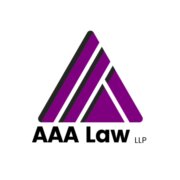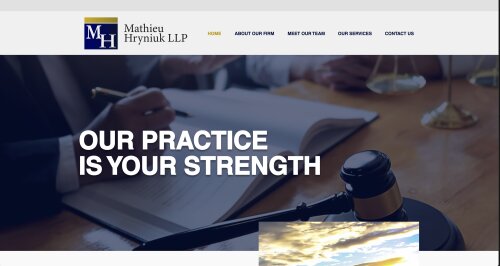Best Tax Lawyers in Toronto
Share your needs with us, get contacted by law firms.
Free. Takes 2 min.
List of the best lawyers in Toronto, Canada
About Tax Law in Toronto, Canada
Tax law in Toronto, Canada, is governed by both federal and provincial regulations. At the federal level, the Canada Revenue Agency (CRA) oversees the administration of taxes including income tax, goods and services tax (GST), and other federal taxes. Provincially, Ontario has its own specific regulations and tax rates that apply to residents and businesses. This framework ensures that individuals and corporations contribute to the funding of public services such as healthcare, education, and infrastructure. Navigating the complexities of these laws can be challenging, which is why understanding or seeking guidance on tax law is crucial for compliance and effective financial management.
Why You May Need a Lawyer
There are several scenarios where an individual or business might require legal help with taxes in Toronto. Common situations include dealing with audits or disputes with the CRA, understanding tax obligations for self-employed individuals, handling tax aspects of a business purchase or sale, managing international tax issues, estate planning and related tax implications, or addressing issues of tax evasion or avoidance. Legal assistance is also beneficial for optimizing tax strategies and ensuring compliance with the ever-changing tax laws.
Local Laws Overview
Toronto, being part of Ontario, abides by the provincial tax laws which include the Harmonized Sales Tax (HST), Ontario Health Premium, and various tax credits like the Ontario Trillium Benefit. The Canada Revenue Agency enforces income tax and credits. Both entities require individuals and businesses to annually file tax returns reflecting all sources of income and applicable deductions or credits. Understanding key aspects of local tax laws, including exemptions, deductions, and filing deadlines, is essential to avoid penalties and make the most of eligible credits.
Frequently Asked Questions
What are the main types of taxes in Toronto?
In Toronto, the main types of taxes include federal and provincial income taxes, the Harmonized Sales Tax (HST), property taxes, and business taxes.
How is the Harmonized Sales Tax (HST) applied?
The HST combines federal and provincial sales taxes into one tax that is levied on most goods and services in Ontario, including Toronto, typically at a rate of 13%.
Do I have to pay taxes on income from a rental property in Toronto?
Yes, rental income from property in Toronto must be reported and is subject to taxation. Allowable expenses can be deducted to reduce the taxable income.
How can I dispute a tax assessment made by the CRA?
If you disagree with a CRA assessment, you can file an objection within the specified deadline, typically 90 days from the date of the notice.
What happens if I don't file my taxes on time?
Failure to file taxes on time can result in penalties and interest charges on any amount owing. It's important to file by the deadlines to avoid these costs.
Can tax lawyers help with financial planning?
Yes, tax lawyers can offer valuable insights and strategies for effective financial and tax planning, ensuring compliance and maximizing savings.
What should I do if I receive a tax audit notification?
If you're notified of a tax audit, it's advisable to consult with a tax lawyer who can help you prepare and represent your interests during the audit process.
Is there tax relief for low-income individuals in Toronto?
Yes, there are several tax credits and benefits available for low-income individuals, such as the Ontario Trillium Benefit and the Canada Child Benefit.
How are charities taxed in Toronto?
Registered charities in Toronto are typically exempt from federal and provincial income taxes, though they must fulfill specific regulatory requirements to maintain their status.
Can non-residents own property in Toronto and what are the tax implications?
Non-residents can own property in Toronto but must comply with specific reporting and tax obligations. Rental income and capital gains are generally taxable in Canada.
Additional Resources
For additional help, consider these resources:
- Canada Revenue Agency (CRA): Provides comprehensive guidelines and forms for tax filing.
- Ontario Ministry of Finance: Offers information on provincial taxes and programs.
- Tax Court of Canada: For resolving tax disputes.
- Canadian Bar Association: Provides resources and a directory of tax lawyers.
Next Steps
If you need legal assistance with tax issues, start by identifying the specific area where you need help, such as audit representation or tax planning. Contact a tax lawyer with experience in Toronto and schedule a consultation to discuss your concerns and options. It's also beneficial to gather relevant documents and records in preparation for your meeting. Engaging a knowledgeable lawyer can make navigating complex tax issues less daunting and ensure compliance with legal requirements.
Lawzana helps you find the best lawyers and law firms in Toronto through a curated and pre-screened list of qualified legal professionals. Our platform offers rankings and detailed profiles of attorneys and law firms, allowing you to compare based on practice areas, including Tax, experience, and client feedback.
Each profile includes a description of the firm's areas of practice, client reviews, team members and partners, year of establishment, spoken languages, office locations, contact information, social media presence, and any published articles or resources. Most firms on our platform speak English and are experienced in both local and international legal matters.
Get a quote from top-rated law firms in Toronto, Canada — quickly, securely, and without unnecessary hassle.
Disclaimer:
The information provided on this page is for general informational purposes only and does not constitute legal advice. While we strive to ensure the accuracy and relevance of the content, legal information may change over time, and interpretations of the law can vary. You should always consult with a qualified legal professional for advice specific to your situation.
We disclaim all liability for actions taken or not taken based on the content of this page. If you believe any information is incorrect or outdated, please contact us, and we will review and update it where appropriate.














